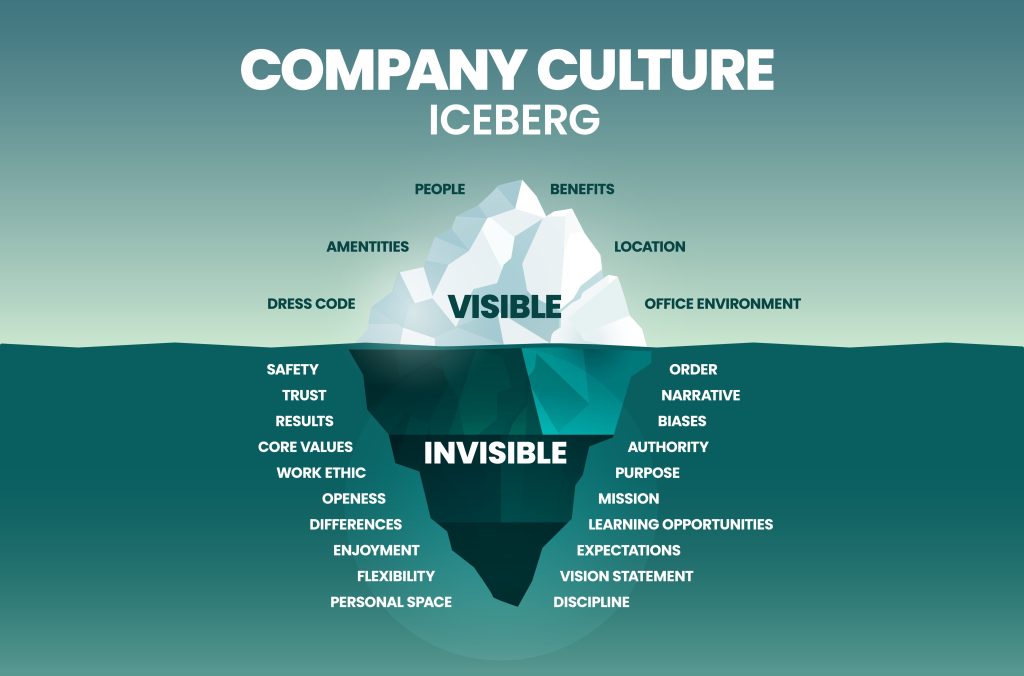
Startup culture is a term that encapsulates the attitudes, values, and behaviors that differentiate startup companies from their more well-established counterparts. It’s the secret sauce, the mojo, the lifeblood that gives a startup the power to innovate and outperform even the largest of competitors.
This lively and dynamic environment, typically marked by open communication, flexibility, and a passionate commitment to the mission, plays a pivotal role in shaping the startup’s future. Let’s be real, people are your cherished treasure, and when we talk about people, their collective approach shapes your company culture.
Your startup culture, when cultivated thoughtfully and intentionally, can be the catalyst for extraordinary growth and success. Ignored or mishandled, however, it can easily turn into your Achilles’ heel.
Heart of An Effective Startup Culture
“Your culture is your brand.”
– Tony Hsieh, CEO of Zappos
Company culture is so much more than just ping-pong tables and casual Fridays. It is the collective behavior of your team, encompassing values, visions, norms, and habits. It’s how people behave and interact, what they believe, and how they work. It’s the personality of your business, the heart and soul that determines how your crew performs.
In a startup that is still trying to have it’s firm footing, it is an investment that pays dividends in ways you wouldn’t imagine.
- It shapes your company’s persona, influencing your brand image.
- It sets the pace for your journey, driving growth and change.
- It weaves a community of dedicated souls, enhancing employee engagement.
Fostering a potent startup culture requires a startup owner’s initiative and decisive action, but it also demands a keen understanding of the type of environment that encourages innovation, productivity, and, above all, collective growth. With the right blend of elements, your startup culture can become your most impactful guide in the complex voyage of entrepreneurship.
Let’s dive into some key elements of a strong startup culture:
- Clear and compelling mission: A strong startup culture is anchored in a clear and compelling mission. This mission, which goes beyond just making money, serves as the North Star for the entire team. It provides a sense of purpose and direction, making employees feel that they are part of something bigger than themselves.
- Values: These values, which could range from innovation and risk-taking to customer focus and teamwork, shape the behavior and decision-making within the startup. They act as the startup’s moral compass, guiding how employees interact with each other and with external stakeholders.
- Foster open communication: In a startup, everyone’s opinion matters. Encouraging open dialogue and feedback not only fosters innovation but also builds trust and respect among team members.
- Learning and development: Building a culture that encourages learning and development is another surefire way to success. Startups are fast-paced, dynamic environments where change is the only constant. By promoting continuous learning and providing opportunities for personal and professional growth, startups can ensure that their teams are always ready to adapt and evolve.
- Appreciate and reward: Celebrate like a champion and accept failure with grace. Applauding hard work and accomplishment keeps morale sky high, while viewing setbacks as stepping stones builds resilience and encourages persistence.
Practical Strategies for Building a Cohesive Startup Team
Getting the right people on board and aligning their talents towards achieving common goals is like mixing chemicals; subtle, yet explosive. So how do you make this innovative cocktail?
So, let’s plunge into how you can build this cultural backbone for your startup.
Assemble the Right Crew
Building a startup is not just about hiring the best talent, but also about finding the right fit for your company culture. This doesn’t mean hiring people who are all the same, but rather individuals who share your vision and values, and are passionate about the mission of your startup. Skillset is crucial, but a harmonious workspace demands more than just technical ability.
Foster Open Communication
The lifeblood of a thriving startup is transparent and meaningful communication. This includes setting expectations from the start. A free flow of ideas, feedback and queries helps to foster a trusting and growth-oriented environment.
Don’t just encourage your team to speak up; empower them to have a say in decision-making.
Invest in Team-building Activities
Much like a car engine needs tuning, teams need maintenance for optimal performance. Regular team-building activities, ranging from simple ice breakers to more complex retreats or workshops, not only foster camaraderie and trust among team members, but also provide them the chance to think, work, and celebrate together. These shared experiences can create a stronger bond, which in turn, enhances teamwork and productivity.
Encourage Personal and Professional Growth
As a leader, you have to play the role of a gardener, nurturing and enabling growth for your team members. Provide opportunities for professional development, such as training programs or mentorship, to help them learn, grow, and upskill themselves.
When team members feel that they are growing and learning, they are more likely to stay engaged and committed to the company. This not only makes them feel valued, but it also ensures a supply of fresh ideas and perspectives to your startup.
Constant Feedback and Recognition
Recognizing and rewarding hard work goes a long way in building a cohesive team. This can be as simple as a shout-out in a team meeting, or as significant as a promotion or bonus. Appreciating the efforts put in by your team members and giving regular constructive feedback helps reinforce positive behavior and facilitates gradual improvement.
This small but significant gesture can help boost morale and further the sense of belonging within the team.
Promote Leadership
Every team member has a leader within, waiting to rise and shine. Startups should endeavor to nurture this leadership potential by giving responsibilities, encouraging initiative and rewarding proactive behaviours. It helps them build a stockpile of future leaders while getting the best out of the present ones.
Prioritize Wellbeing
A healthy, happy team leads to a productive, successful startup. Emphasizing physical and mental wellbeing, providing a decent work-life balance, and creating an environment of mutual support and understanding fuels passion, reduces burnout, and fosters unity, making it an integral part of startup culture.
Encourage Diversity
The diversity in a startup is like having a rainbow of capabilities. You respect uniqueness and accommodate differences. By not just allowing, but encouraging different voices to be heard and valued, startups can tap into a wider range of ideas and approaches. They can also make better decisions, as they will have a more complete understanding of their diverse customer base.
Maintain Transparency
Transparency is important for your startup. It helps breed trust among employees, instills confidence, and fosters a culture of honesty. Taking transparent decisions ensures everyone in the team is on the same page and contributes to a sense of fairness and equity.

Challenges in Fostering Growth Culture & Ways to Overcome Them
Startup life can be wild and woolly. Something as ostensibly simple as fostering a growth culture can be riddled with speed bumps and roadblocks.
Let’s delve into some of these challenges and chart out a roadmap to conquer them.
Limited Resources
Problem: Startups often face the challenge of establishing a culture of growth due to limited resources. Unlike established companies, startups typically operate on a shoestring budget, which can make it difficult to invest in employee development programs or offer competitive salaries.
Solution: However, startups can overcome this by leveraging their unique advantages. For instance, they can offer employees the opportunity to take on diverse roles, providing them with a breadth of experience that is often unavailable in larger companies.
Lack of Structure
Problem: Another challenge startups face is the lack of established processes and structures. This can lead to confusion and inefficiency, hindering the company’s growth.
Solution: To overcome this, startups need to invest time in creating clear processes, roles, and responsibilities. This not only improves efficiency but also helps employees understand their role in the company’s growth.
Cultural Decay
Problem: Startups also grapple with the challenge of maintaining a consistent culture as they grow. Rapid growth can dilute a company’s culture if not managed carefully.
Solution: To mitigate this, startups should clearly define their mission, vision, and values from the outset and ensure these are communicated and reinforced regularly. This helps to create a strong foundation for the company’s culture.
Resistance to Change
Problem: If there’s one constant thing in a startup, it’s change. Change in company culture can be discomforting, and employees might resist it. This resistance if not dealt effectively can cascade down, hindering growth and innovation.
Solution: Preconditioning. Encourage and reward adaptability. Set the expectations right from the start that the nature of the startup environment is dynamic. Regularly communicate company growth strategies and changes in real-time to the team, making them an integral part of the process.
Lack of Clear Vision
Problem: It can be a perplexing challenge. Imagine trying to solve a puzzle in complete darkness – that is what lack of clear vision does. It hinders growth and leads to confusion in decision-making.
Solution: Clarity. Make sure everyone knows where the company is headed! Clearly define and then communicate the company’s mission, vision, and core values. This simple act can charge up your team and align them to the company’s growth trajectory.
Unhealthy Competition
Problem: A little competition can amplify productivity, but an overdose can lead to a battlefield – every person for themselves, team synergy going for a toss.
Solution: By fostering collaboration. Cultivate an environment where team members are encouraged to work together towards a common goal rather than pulling each other down in a race to the finish line.
High Attrition Rates
Problem: In this age of opportunity, good talent can be tough to retain. Without the reputation or resources of larger companies, this can be a daunting task. The resulting attrition can disrupt the growth culture.
Solution: Prioritizing people. Make your employees happy. Foster a work environment aligned with their values and aspirations. Regular feedback, rewards and recognition system, fostering opportunities to learn and grow – these go a long way towards cementing your team in place.
Wrap-Up
Building this resilient cultural backbone may seem challenging, but it paves the path for long-term success. Let’s remember what Brian Chesky, Co-Founder of Airbnb, once said:
“A company’s culture is the foundation for future innovation. An entrepreneur’s job is to build that foundation.”
Building a cohesive startup team is a continuous, meticulous, and deeply rewarding process. Remember, Rome wasn’t built in a day – and neither is a great team culture. Patience, effort, and genuine care are the primary bricks that build the structural integrity of your startup’s success.
Remember, your culture is what sets you apart. It’s your secret sauce, your mojo! And what’s better than having a purpose-driven team that brings this mojo to life every single day?
In the end, the secret to a thriving startup isn’t just about securing the next round of financing or developing the next killer app. It’s about the strength of your culture and the crew you’ve assembled to weather the storms and navigate toward success together.



